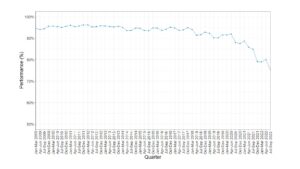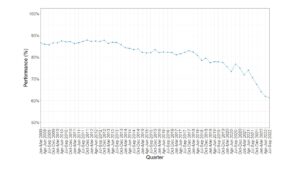
In 2000, the UK Government implemented the NHS Cancer Plan. This programme looked at prevention, diagnosis, treatment, care and research and intended to review the strategy in which the NHS tackles cancer. Shorter waiting times understandably ease patient anxiety and lead to an earlier diagnosis, quicker treatment, lower risk of complications and improved outcomes.
Following this NHS Cancer Plan, access to diagnosis and treatment has evolved and we now have what is commonly known as “the 62-day pathway”. This provides the following target timescales for diagnosis and treatment:
- 14 days – from the GP referral to first being seen by a specialist
- 28 days – from the GP referral to the patient being told they either do or do not have cancer
- 62 days – from GP referral to first treatment
100% achievement is not expected; patients may not be available for treatment within the time limit, may choose to delay, or it may not be clinically appropriate to treat them this quickly.
There are to be reviews every three months and a report published summarising the findings. The most recent report was released on 10 November 2022 for Quarter 2 of 2022/2023 and covers the months July to September 2022. In summary, it is not good news. The data is described as “shocking” by some NHS oncologists. There is increasing pressure on the Government to provide staffing and resourcing to the NHS to facilitate improvement in cancer diagnosis and treatment times.
The “two week wait”
A patient with suspected cancer should be seen by a specialist within a maximum of two weeks after being urgently referred. The operational standard states that 93% of patients should be seen within this timeframe. In Quarter 2 of 2022/2023, only 75.3% of patients who were urgently referred to specialists were seen within 14 days. There has been a downwards trend in this “two week wait” time being met, more so since the beginning of the pandemic, as per the graph below.

31 days from diagnosis to first treatment
When it comes to starting treatment, patients should wait no longer than 31 days from receiving their diagnosis. This target applies to all cancer diagnoses. The 31 days start at the point when the patient is informed of their diagnosis and their package of care is agreed. The operational standard is 96%. In Quarter 2 of 2022, 92% of patients started treatment within 31 days.
Care providers are not far off achieving the targets for beginning treatment for cancer patients, although they are still falling short of target. As with the two week wait target, there is a downwards trend, particularly since the start of the pandemic.
31 day wait for second or subsequent treatment
Patients should receive their second or subsequent treatment within 31 days of their first. For different treatment types, the data is broken down as follows for Quarter 2:
- Anti-cancer drug regimen (chemotherapy, immunotherapy etc) – 98.2% received treatment within 31 days, against a target of 98%.
- Surgical treatment – 81% received treatment within 31 days against a target of 94%.
- Radiotherapy – 90.2% of patients received treatment within 31 days against a target of 94%.
62-day urgent referral to first treatment
The operational standard requires 85% of patients to wait a maximum of 62 days to start their first treatment following an urgent referral. In Quarter 2, only 61.3% of patients were treated within 62 days. This again represents a dramatic trend in recent years, even predating the pandemic, as per the graph below.

Reviewing the statistics by the cancer type, those receiving their first treatment within 62 days was as follows:
o Breast cancers; 71.9%
o Lung cancers; 51.7%
o Lower gastrointestinal cancers; 41.6%
o Urological cancers; 52.6%
o Skin cancers; 83.9%
Recovery from pandemic
The NHS has been under immense pressure since the start of the pandemic. The number of cancer referrals and treatments significantly reduced during this period; an estimated 30,000 to 40,000 patients were not diagnosed/treated. In December 2020, the Government announced plans to repair the provision of cancers services by March 2021. Its main aims were to:
- Restore demand into cancer services to at least a pre-pandemic level;
- Reduce the number of patients waiting longer than they should; and
- Ensure sufficient capacity to manage future demand.
The March 2021 date was not met, neither was the revised date of March 2022 met, and experts do not share the Government’s optimism that this target will be achieved by the further revised date of March 2023.
Conclusion
From review of the above statistics, there is an increasing failure within the NHS to hit their target to see patients within the required timeframe in comparison with previous years. Only 7% of hospital trusts are hitting the required treatment time targets. This equates to many thousands of patients each month not being treated within the target time. These delays impact a patient’s quality of life and chances of survival. Sometimes, a delay in diagnosis or accessing treatment is the difference between curative and palliative treatment.
Experts working in the NHS are gravely concerned about this downwards trend, and the shortage of funds that lies behind it.
There is never a good time to be diagnosed with cancer, but an early diagnosis is much better than a late one. It is important, now more than ever, to seek medical opinion if you have any symptoms of cancer. It is vital to attend any routine screening programmes you may be invited to; screening is very effective at detecting cancer early.
We are medical negligence claims experts
Enable Law specialises in medical negligence, and we are here to advise and help you if you have concerns about the treatment in your cancer care. Should you have any concerns regarding your medical care, please contact us to speak to one of our specialist advisors.


















